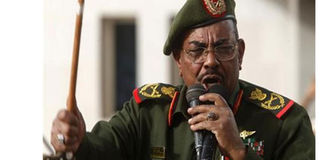Sudan accuses US of interference over protests

Photo | FILE
Sudanese President Omar Hassan al-Bashir.
KHARTOUM, Wednesday
Sudan has accused the United States of interference by criticising a crackdown on the country's 12-day-old protest movement.
"Sudan rejects intervention in its internal affairs," foreign ministry spokesman Al-Obeid Meruh said in a statement.
"The USA is not qualified to advise on such an issue because it continues bombing civilians in different parts of the world and it cracked down on demonstrators on Wall Street."
He was responding to comments Tuesday by State Department spokeswoman Victoria Nuland who said that "arresting and mistreating protesters" will not solve Sudan's political and economic crises.
"There have been reports of protesters being beaten, imprisoned and severely mistreated while in government custody. We call for the immediate release of those detained for peaceful protest," she said.
Rights groups say scores of people have been arrested since the protests against inflation began on June 16 at the University of Khartoum.
After President Omar al-Bashir announced austerity measures including tax hikes and an end to cheap fuel, the protests spread to include a cross-section of the population in numerous locations throughout the capital and several other parts of Sudan.
Demonstrators in groups of 100 or 200 have burned tyres, thrown stones and blocked roads in a growing call for regime change, which has been met by police tear gas.
On Wednesday, students in the eastern town of Kassala took to the streets for a second day in a row, witnesses said.
About 100 young people, carrying pictures of an allegedly detained colleague, marched against high food prices until riot police confronted them with tear gas, they said.
"After 23 years of endurance, the Sudanese people have decided to say enough is enough," Sudan Change Now, an activist youth movement, said in a statement.
"These protests although initially triggered by the economic crisis in the country, are more than that; they are protests against a dictatorship, an oppressive, corrupt, incompetent government that has lied to us for two decades and must be stopped."
Britain also raised concern over developments in Sudan.
On Tuesday, Britain's minister for Africa, Henry Bellingham, called for "the immediate release of those detained while engaged in peaceful protest and for the security forces to act with restraint and avoid the use of force."
New York-based Human Rights Watch said Sudan should "end the crackdown on peaceful protesters, release people who have been detained, and allow journalists to report freely on the events".
The watchdog said more than 100 people are estimated to still be in detention.
Sudan has lost billions of dollars in oil receipts since South Sudan gained independence last July, taking with it about 75 percent of Sudanese crude production.
The north has been left struggling for revenue, plagued by inflation, and with a severe shortage of dollars to pay for imports.
In its statement, the foreign ministry blamed Sudan's economic troubles on American sanctions. In 1997 the United States imposed a trade embargo on Sudan over human rights and other concerns.
Protests by tens of thousands in 1964 and 1985 helped bring about the downfall of the Sudanese regimes then in office.
Bashir, an army officer who seized power in June 1989, has called the latest protests small-scale and not comparable to the Arab Spring uprisings against regional strongmen over the past year.




